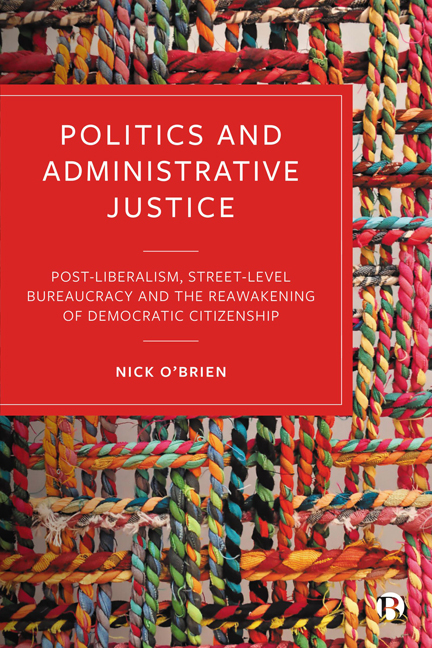 Politics and Administrative Justice
Politics and Administrative Justice Book contents
- Frontmatter
- Dedication
- Contents
- About the Author
- Acknowledgements
- 1 Introduction
- 2 Street-Level Bureaucracy and the Response to Citizen Grievance
- 3 The ‘Social Imaginary’ of Liberal Legalism
- 4 The Promise of Postliberalism
- 5 Citizen Grievance and the Spectre of Legalism
- 6 Postliberal Accountability: The Challenge of Disability Human Rights
- 7 Responding to Grievance: Mental Health and Special Educational Needs and Disability
- 8 Postliberal Administrative Justice
- 9 Conclusion
- References
- Index
9 - Conclusion
Published online by Cambridge University Press: 27 March 2024
- Frontmatter
- Dedication
- Contents
- About the Author
- Acknowledgements
- 1 Introduction
- 2 Street-Level Bureaucracy and the Response to Citizen Grievance
- 3 The ‘Social Imaginary’ of Liberal Legalism
- 4 The Promise of Postliberalism
- 5 Citizen Grievance and the Spectre of Legalism
- 6 Postliberal Accountability: The Challenge of Disability Human Rights
- 7 Responding to Grievance: Mental Health and Special Educational Needs and Disability
- 8 Postliberal Administrative Justice
- 9 Conclusion
- References
- Index
Summary
In a celebrated essay published in 1958, cultural critic Raymond Williams argued that ‘culture is ordinary’, by which he meant that it comprises both common meanings and special processes of discovery and creative effort (Williams, 1958). Over 60 years later, former Labour MP and Chair of the House of Commons Public Administration Select Committee, Tony Wright, alluded to Williams’ essay in arguing that in a similar way democratic politics is ordinary, most conspicuously practised in the context of everyday life and common meanings (Wright, 2012). Administrative justice is ordinary justice, rooted in the everyday relationships of citizen and state and summoned in aid when those relationships break down. If its therapy is to be transformative, it must be social rather than resolutely individualistic, aimed at providing balm to wounds that are political, in the sense that they derive from the shared experience of the citizen body and entail healing that transcends the individual case. The justice inherent in public administration is the justice inherent in the common good. To realize that form of social justice, its background assumptions and ways of proceeding must be responsive to social need in ways that go beyond individual or legal justice. Administrative justice is, in other words, something more than ‘administrative justice’.
The poetry of street-level bureaucracy
It is rarely that the word ‘Ombudsman’ appears in a published volume of poetry. Yet it does so in a poem by Irish poet Dennis O’Driscoll in his 2012 collection, Dear Life. O’Driscoll, apart from a career as one of contemporary Ireland’s most celebrated poets and the distinction of compiling a collection of acclaimed interviews with his friend Seamus Heaney, spent almost 40 years as an official in Ireland’s Revenue and Customs service. The bureaucratic provenance of aspects of his work is playfully betrayed by titles such as ‘Head Office’, ‘Best Practice’ and ‘Paper Trail’, even when the subject-matter is not ostensibly that of his own desk and office. In ‘Revenue and Customs’, we hear how at the end of a working day the computer files are backed up, the water cooler left to its own devices and the open-plan office abandoned for the night.
- Type
- Chapter
- Information
- Politics and Administrative JusticePostliberalism, Street-Level Bureaucracy and the Reawakening of Democratic Citizenship, pp. 127 - 133Publisher: Bristol University PressPrint publication year: 2023
